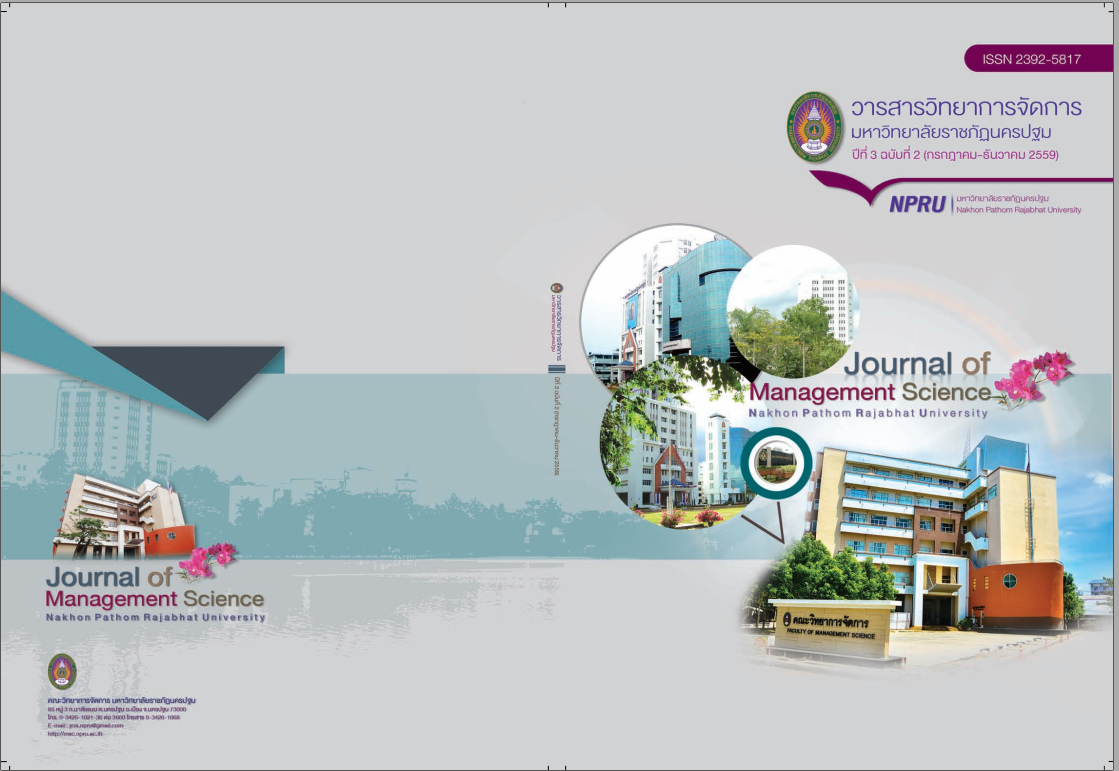The success business management model of the rise in residential real estate economy regression of Bangkok
Main Article Content
Abstract
The objective of dissertation were (1) to study the factors affected the success business management model of the rise in residential real estate economy Regression of Bangkok by the customer (2) to study the factors affected the success business management model of the rise in residential real estate economy Regression of Bangkok by employee and (3) to propose a model of the rise in residential real estate economy Regression of Bangkok. The researchers used the technique to study Mixed Method Research by quantitative research. The sample in this study were customer with real estate sector 400 samples and 400 employees results have been used in the discussion. The results showed that
1. the success of the success business management model of the rise in residential real estate economy Regression of Bangkok by customers Influenced by the positive overall. The factors of distribution channels (b= 0.70), the factors of marketing (b = 0.56), the factors of promotion (b = 0.23) and The factors of product (b = 0.19) was statistically significant. While the factors of price were total positive influence with the factors of distribution channels (g = 0.65), the factors of promotion (g = 0.12) and the factors of product (g = 0.11) was statistically significant.
2. The success business management model of the rise in residential real estate economy Regression of Bangkok by employee the results showed that positive overall. The factors of leadership (b = 0.75), the factor of member in the organization (b = 0.44) and the factors of cultural organization (b = 0.34) was statistically significant. While the membership in the organization of the residential real estate sector rise in the recession of Bangkok Influenced by the overall positive the factors of leadership (g = 0.86) and the factors of Cultural Organization (g = 0.42) was statistically significant.
3. The success business management model of the rise in residential real estate economy Regression of Bangkok must be accepted by the customer. If appropriate use to the marketing strategy mix factors. It contributes to the success of the business. The Real estate investments were much less likely to crash. The selection criteria buy land or invest a few variables it all depends on location. So that is the key factor in the marketing mix factors include distribution channel. This can be a competitive advantage driving to work in the real estate sector, housing flat were requires efforts to work. Executive Leadership may be driven to success but success will not happen if they are not accepted by their followers. In a competitive real estate brokering. Violence has been on the efforts. The work a good organization and a culture that are the main factor that influence success business management model of the rise in residential real estate economy regression of Bangkok.
Article history : Accepted 31 May 2016
SIMILARITY INDEX = 2.99
Article Details
The views and opinions of the article appearing in this journal are those of the author. It is not considered a view and responsibility of the editorial staff.
References
จรูญ ชำนาญไพร. (2557). ตัวแบบภาวะผู้นำการเปลี่ยนแปลงและความผูกพันองค์การ ที่ส่งอิทธิพลต่อการเป็นสมาชิกที่ดีของตลาดกลางสินค้าเกษตรขนาดใหญ่ของไทย. วารสารวิชาการ มหาวิทยาลัยกรุงเทพธนบุรี. 2 (2), 144-123.
ฉัตยาพร เสมอใจ. (2550). พฤติกรรมผู้บริโภค. กรุงเทพฯ : ซีเอ็ดยูเคชั่น.
ธนาคารแห่งประเทศไทย. (2556). การพาณิชย์อิเล็กทรอนิกส์. [ออนไลน์] ค้นเมื่อ 8 มกราคม 2559 จาก https://www.bot.or.th/Thai/PaymentSystems/Others/eCommerce/Pages/eComerce .aspx.
ศิริวรรณ เสรีรัตน์และคณะ. (2543). หลักการตลาด. กรุงเทพฯ บริษัท ธีระฟิล์มและไซเท็กซ์ จำกัด.
Bass, B. M. (1990). From transactional to transformational leadership : Learning to share the vision. Organizational Dynamics. 18, 19-31.
Cochran, W.G. (1953). Sampling Techniques. Experimental Designs. New York. Cuyno.
Cooke, R. A., & lafferty, J.C. (1991). Organization culture in ventory. Plymouth Ml : Human Syner- Gistics.
Fiedler, and Joseph E Garcia. (1987). New approaches to effective leadership : cognitive resource and organizational performance. New York : John Wiley.
George, J. M. and G.R. Jones. (1999). Understanding and Managing : Organizational Behavior. (2nd ed.) New York: John Wiley & Son, Inc.
Kaplan, Robert S; Norton, D. P. (1992). The Balanced Scorecard - Measures That Drive Performance. Harvard Business Review. (January–February): 71–79.
Kotler, P. and Armstrong, G. (2006). Principles of marketing. (7th ed.). New Jersey : Pearson Education.
Organ, D. W. and Bateman, T. S. (1991). Organizational Behavior. (4th ed.), Boston : Irwin, Inc.
Sergiovanni, T. J. & Moore. J.H. (1989). Schooling for Tomorrow. Boston : Allyn & Bacon.
Smith, C. A., Organ, D. W. and Near, J. R. (1983). Organizational Citizenship Behavior : Its Nature and Antecedent. Journal of Applied Psychology. 68 (4): 653-663.


